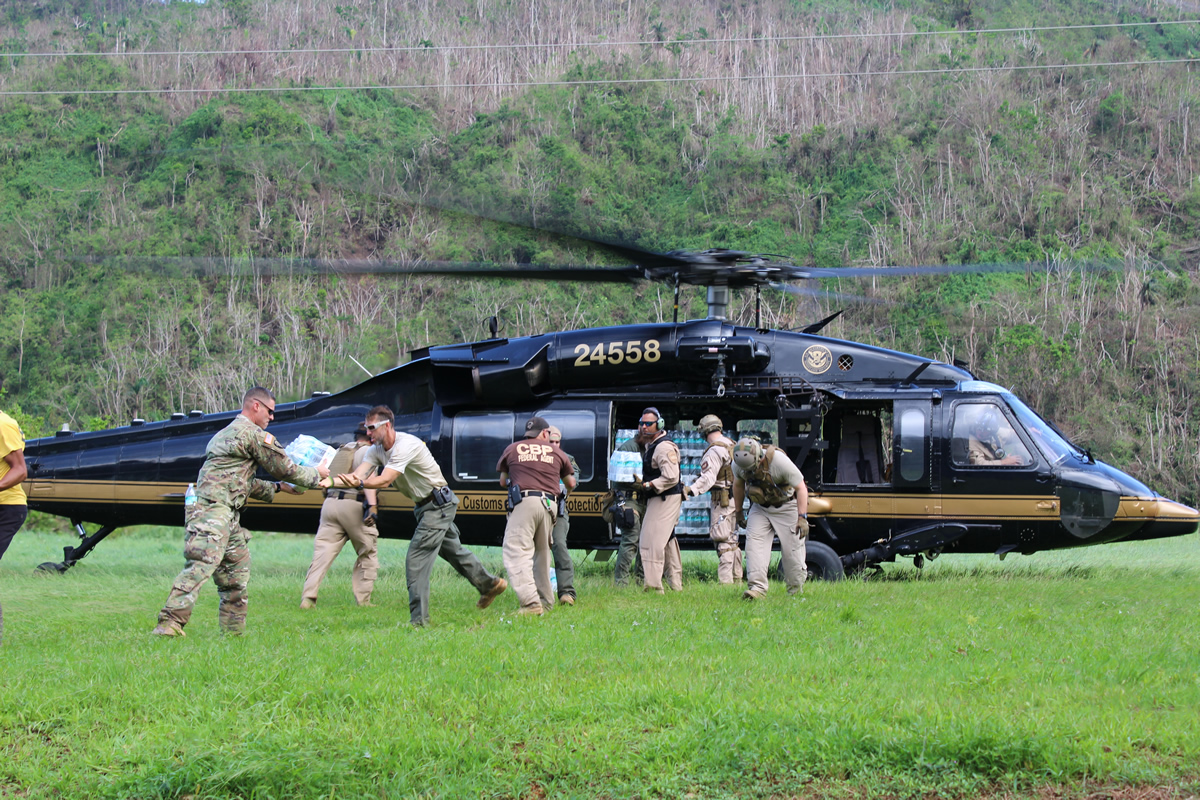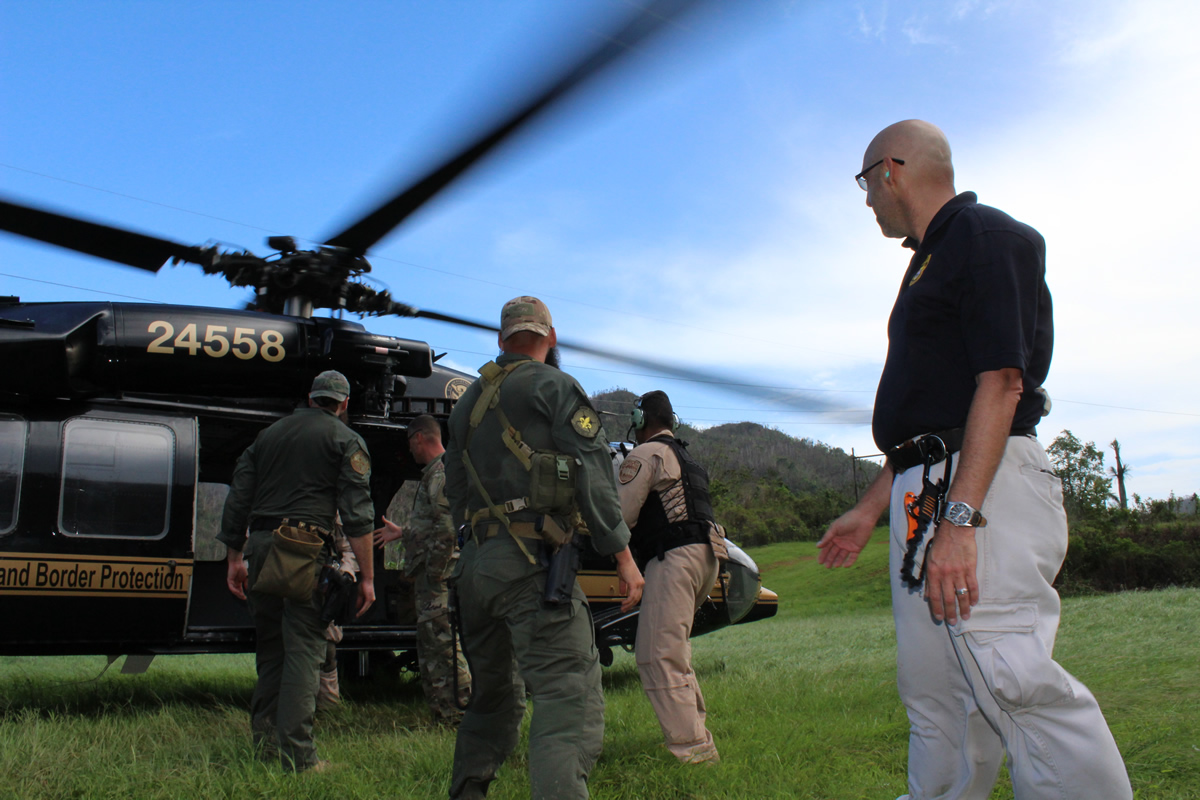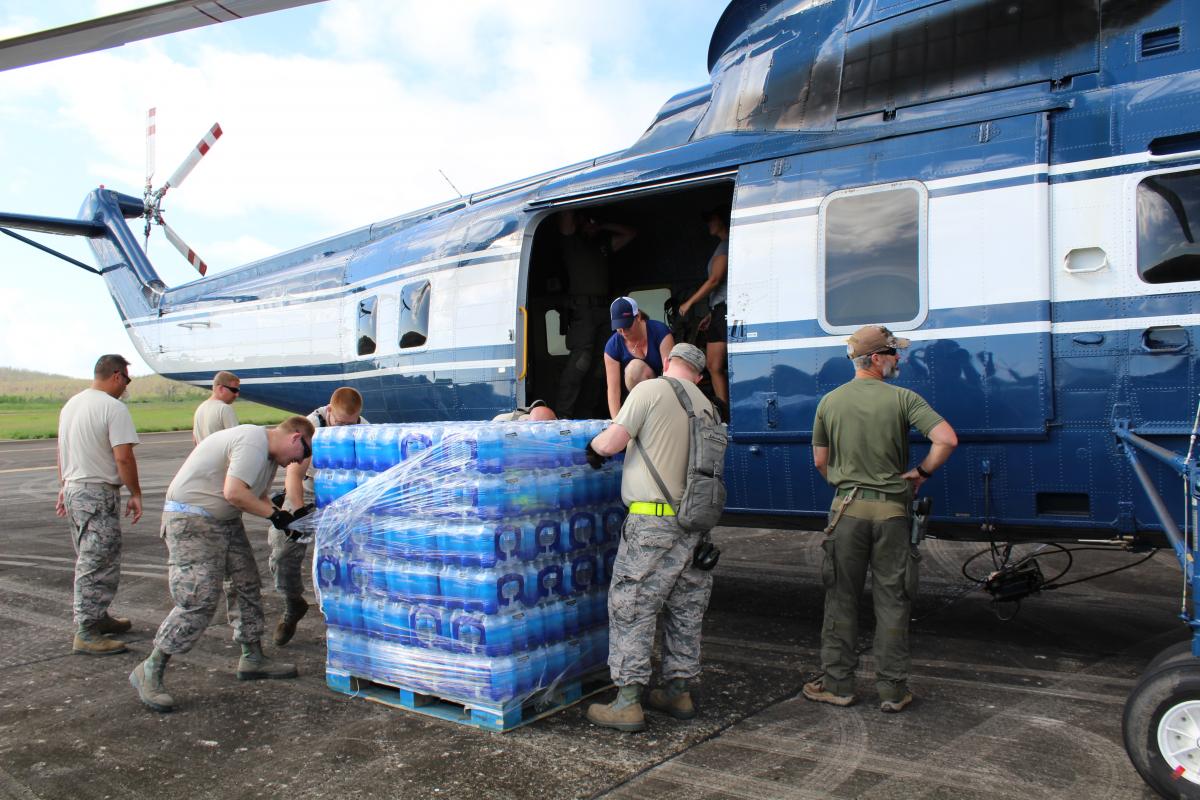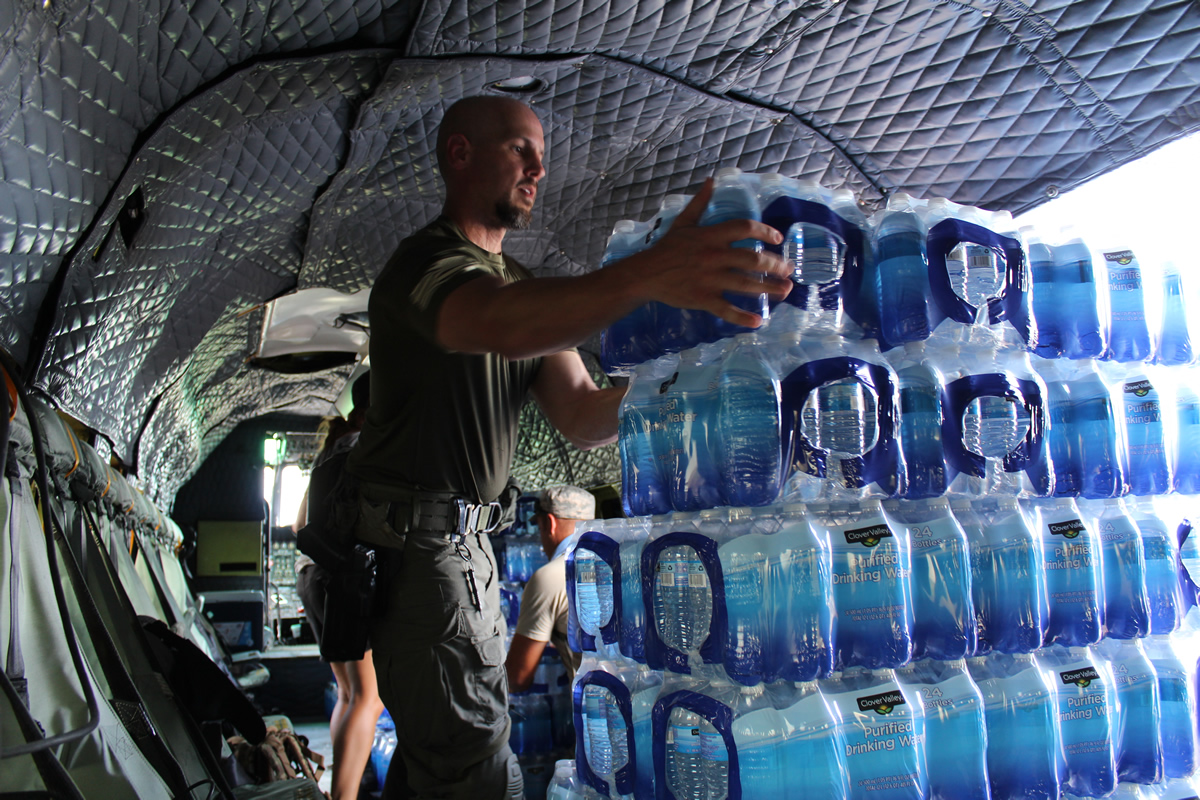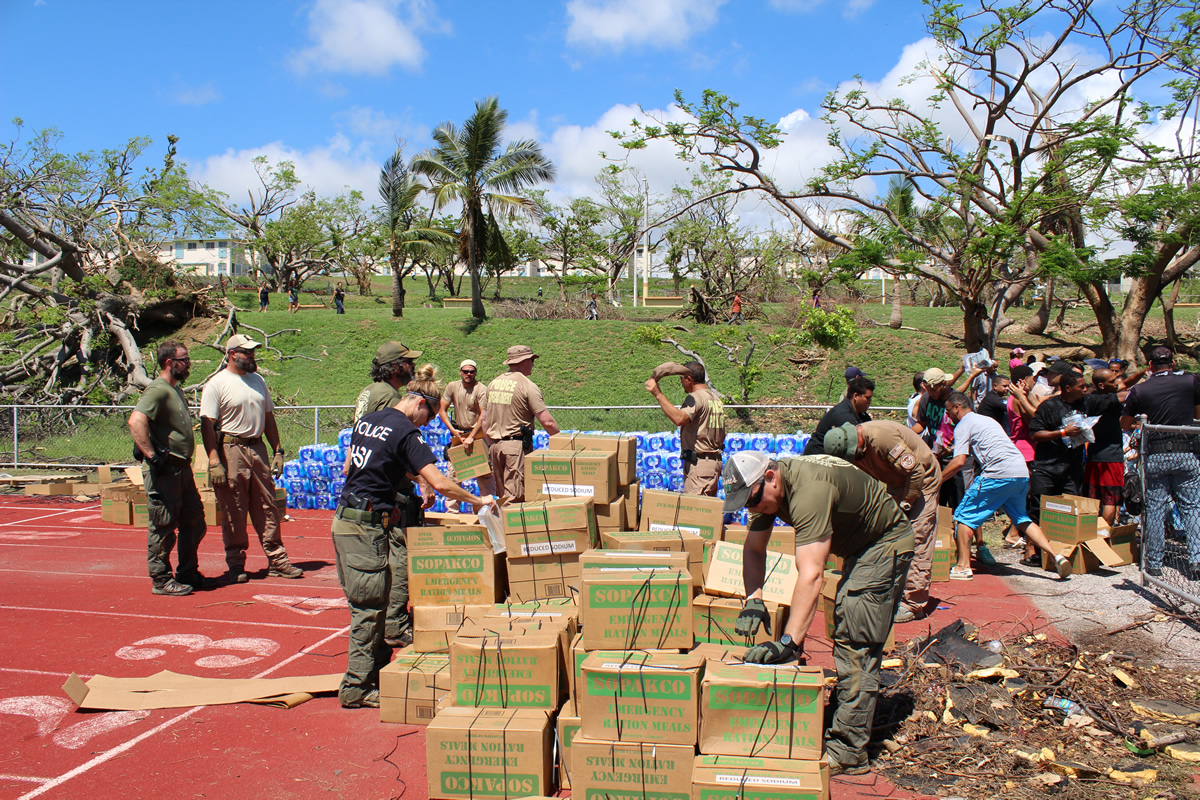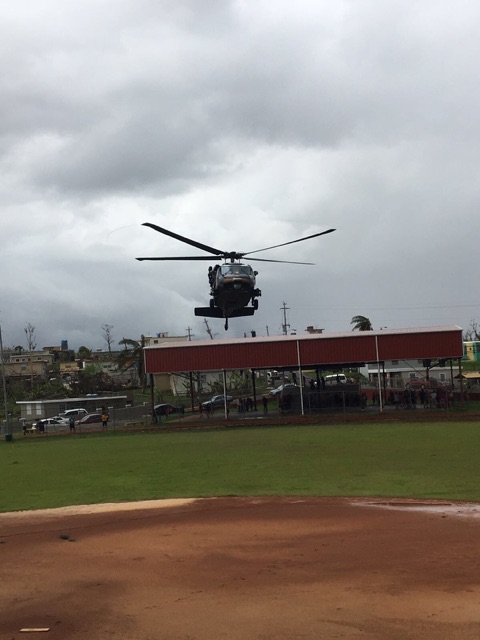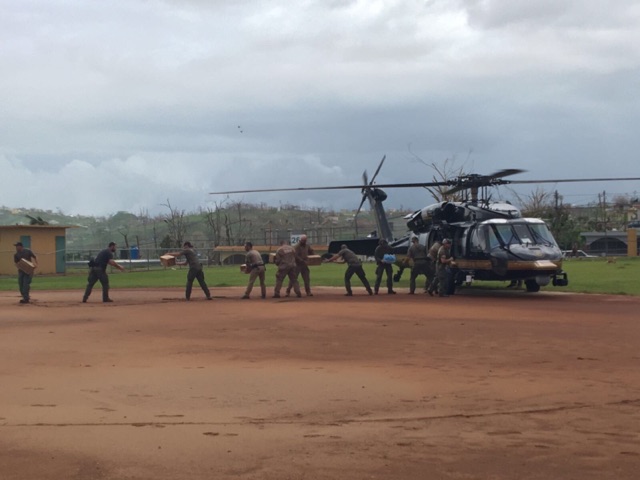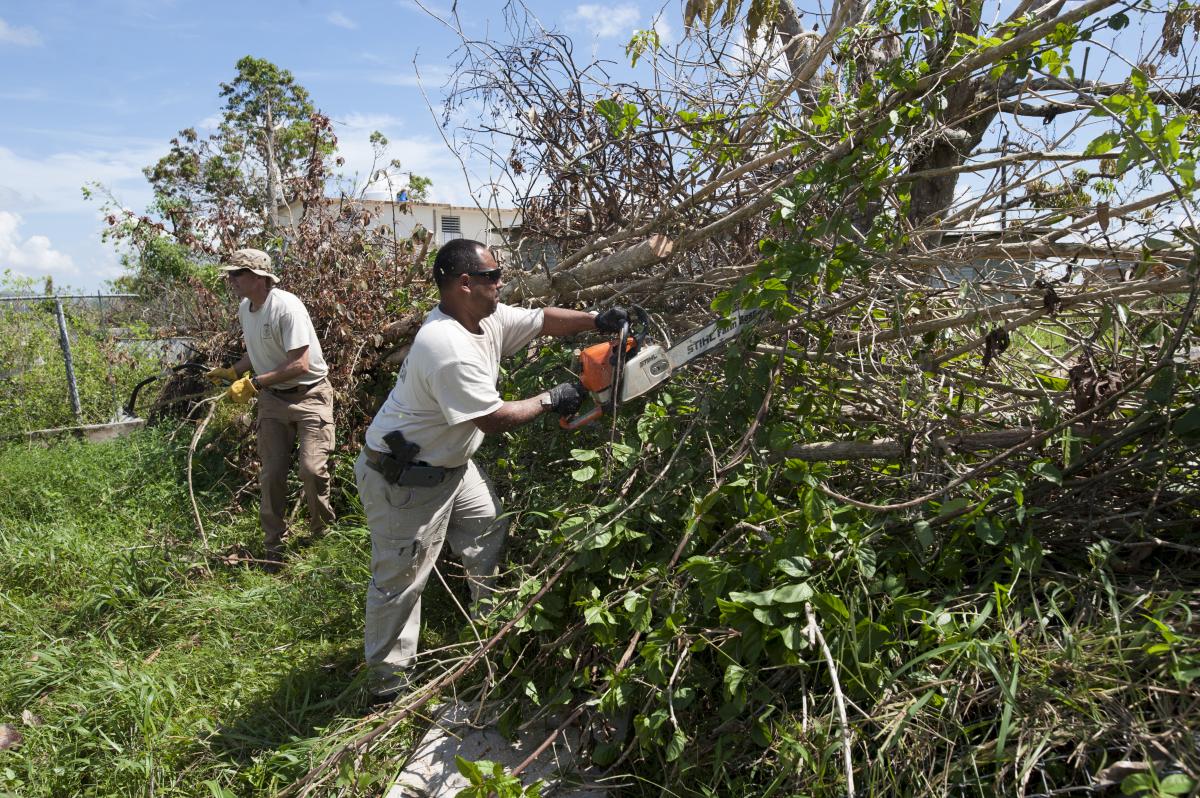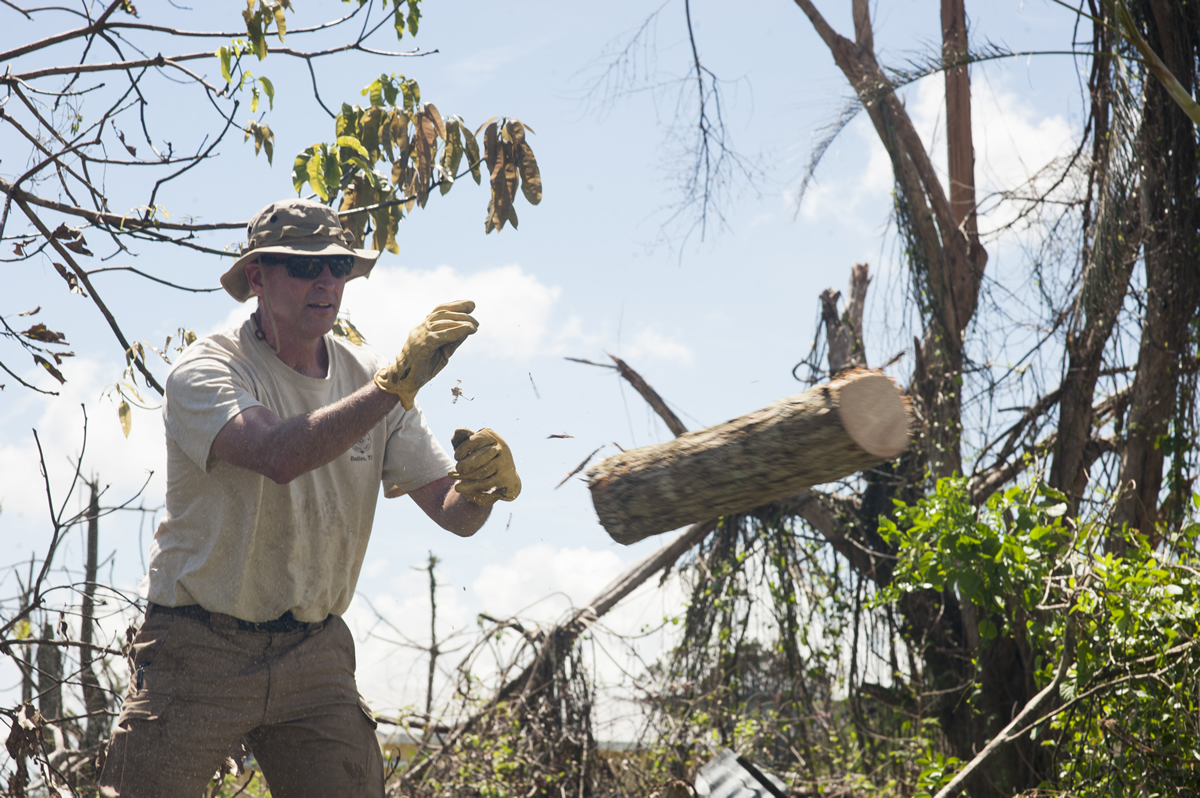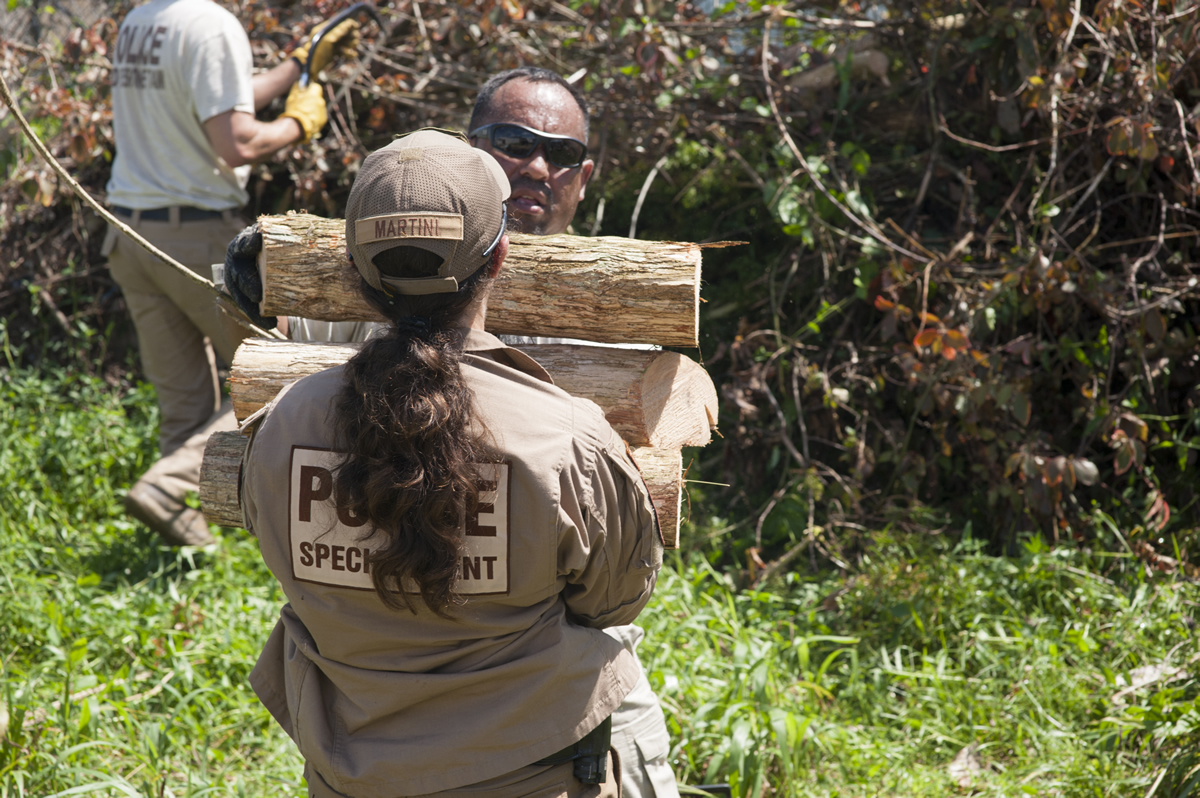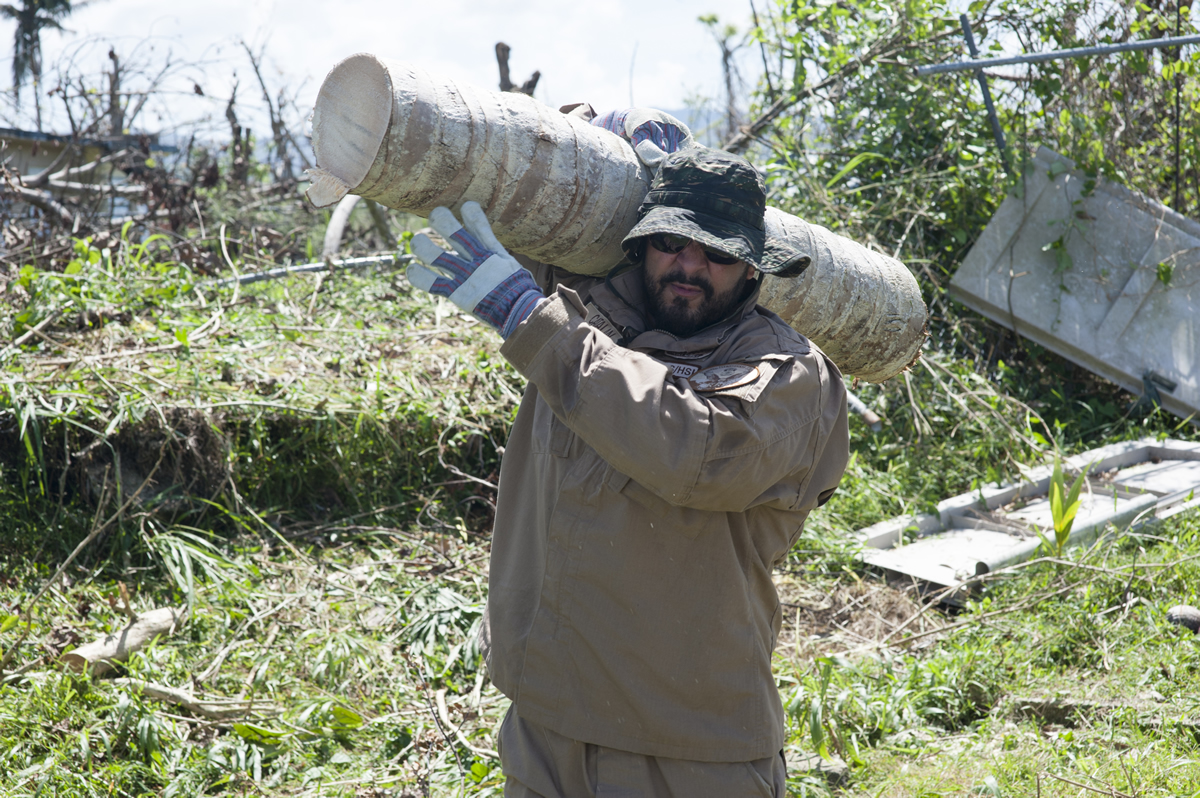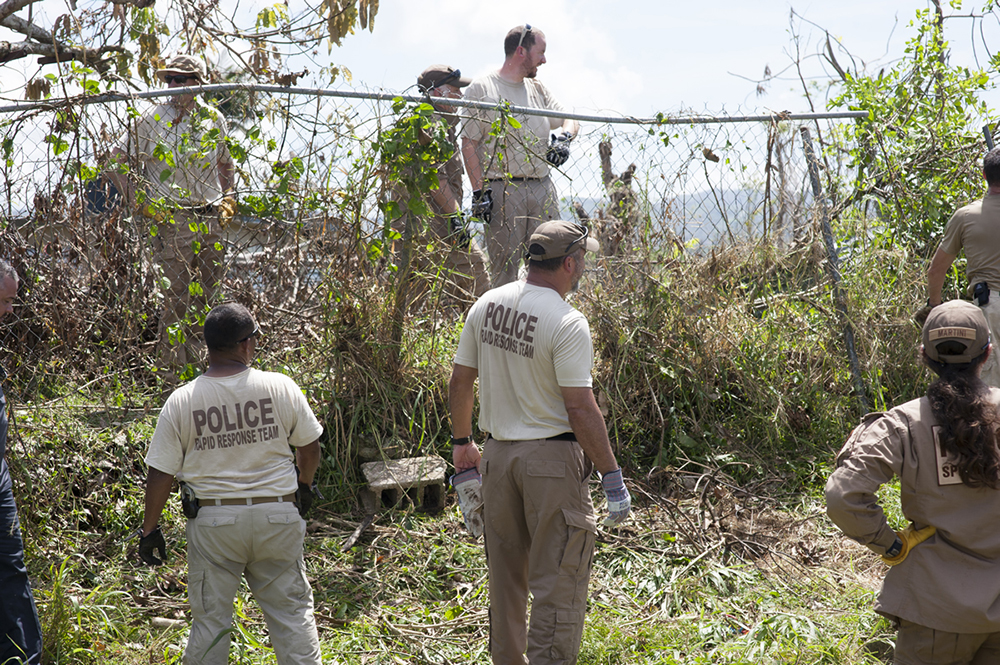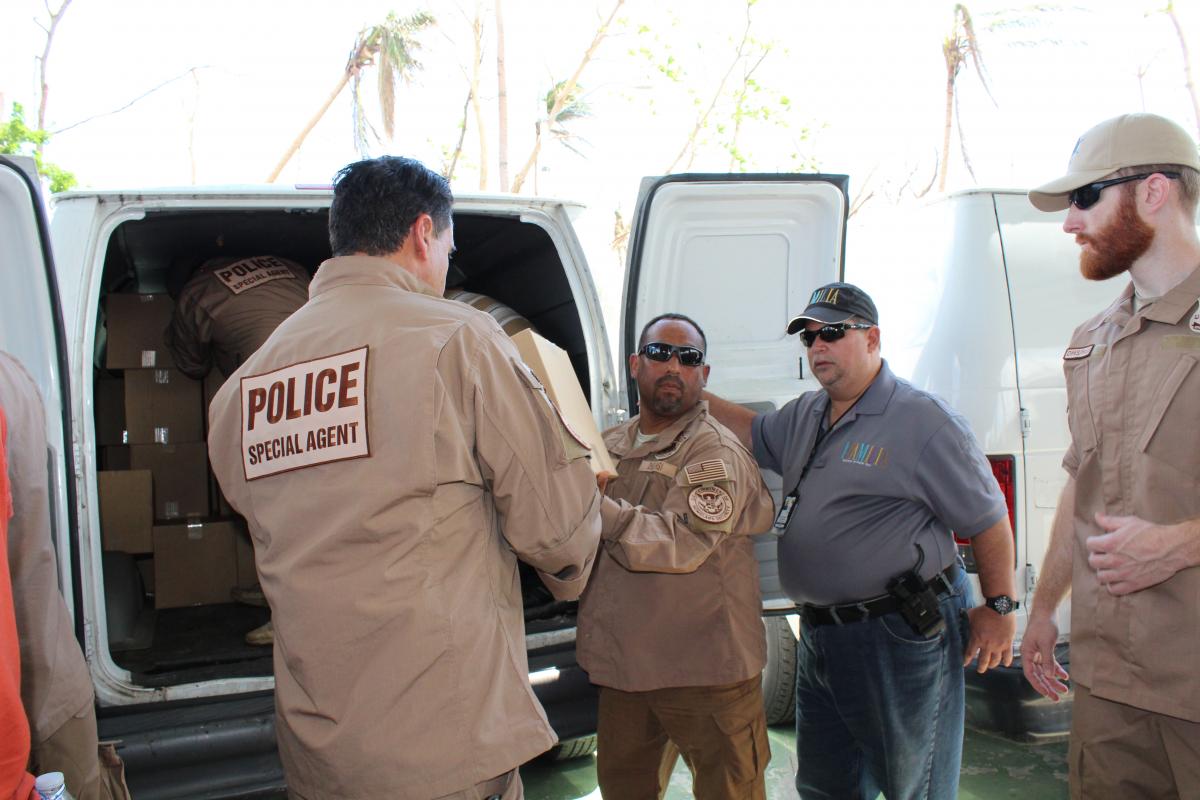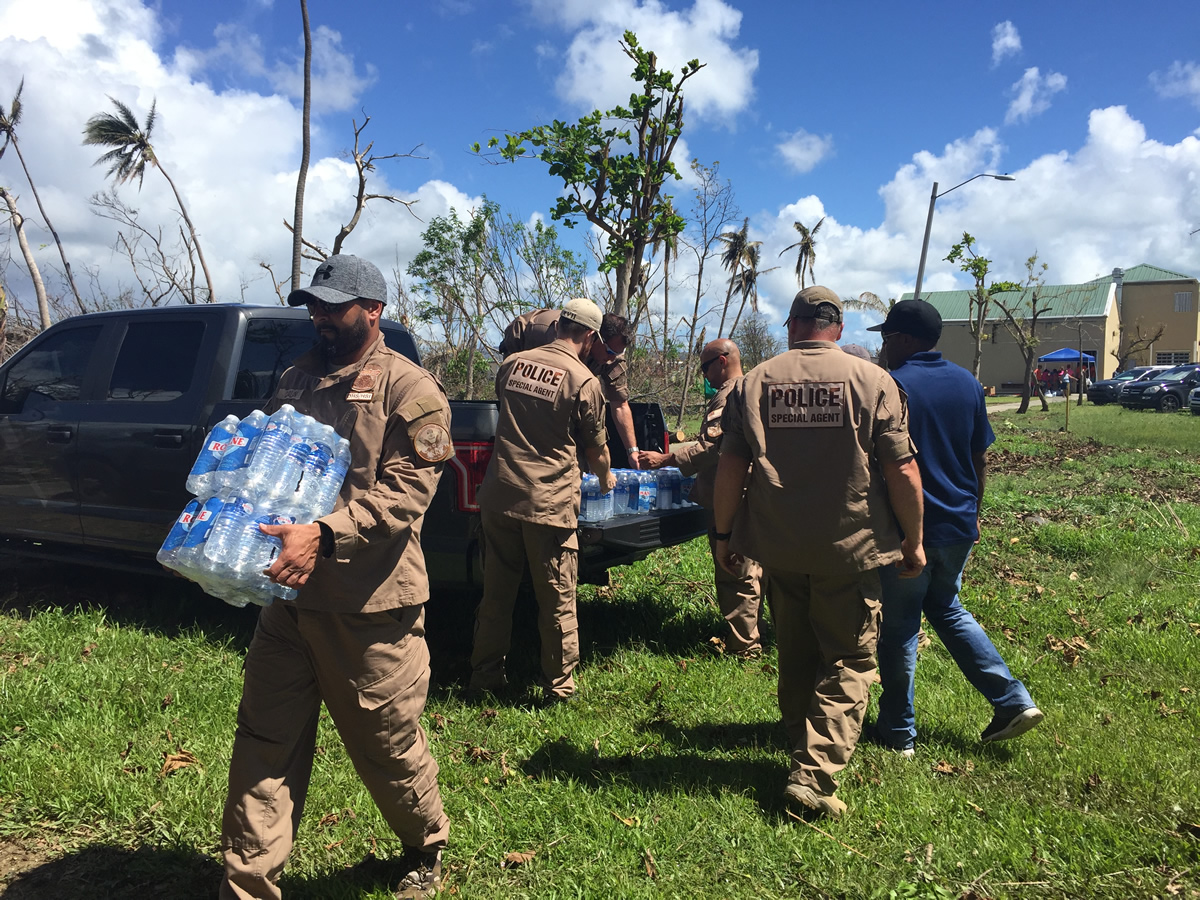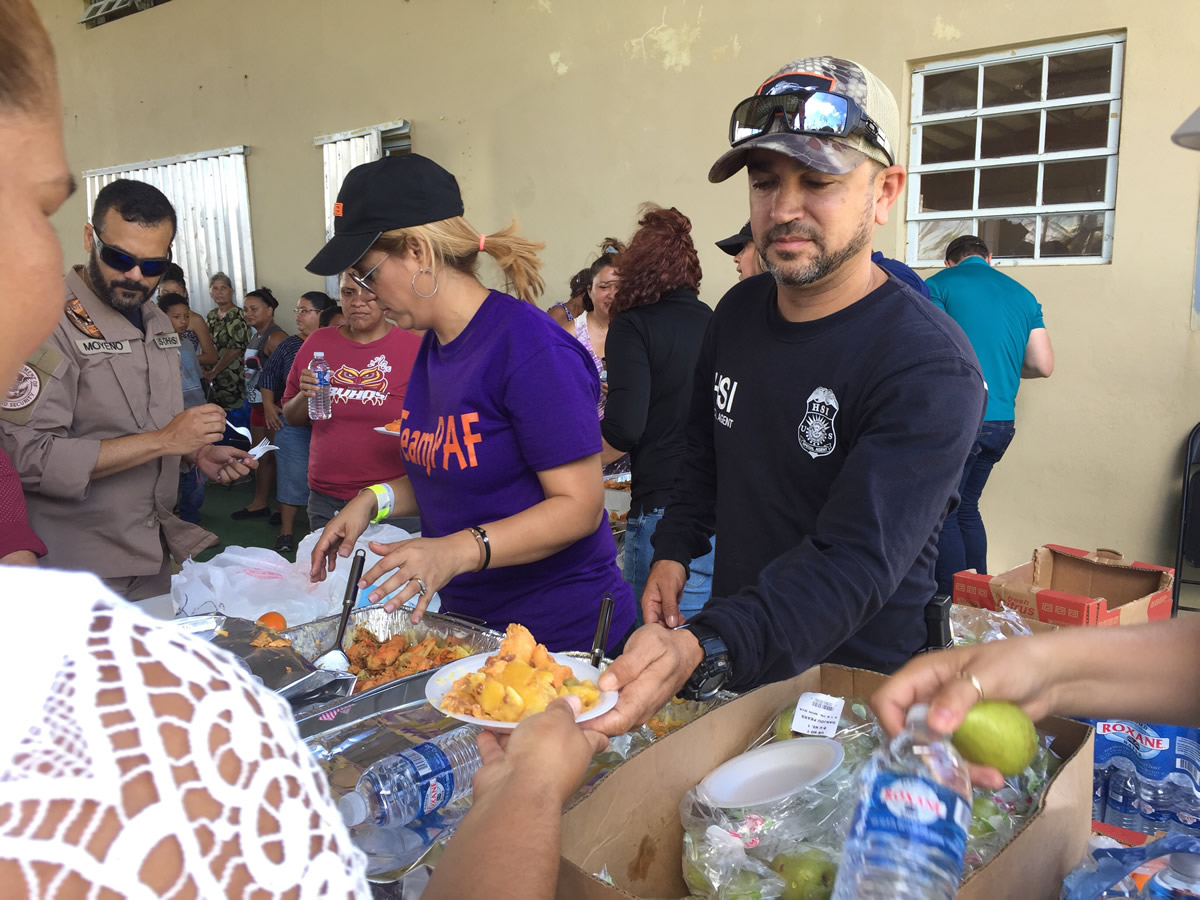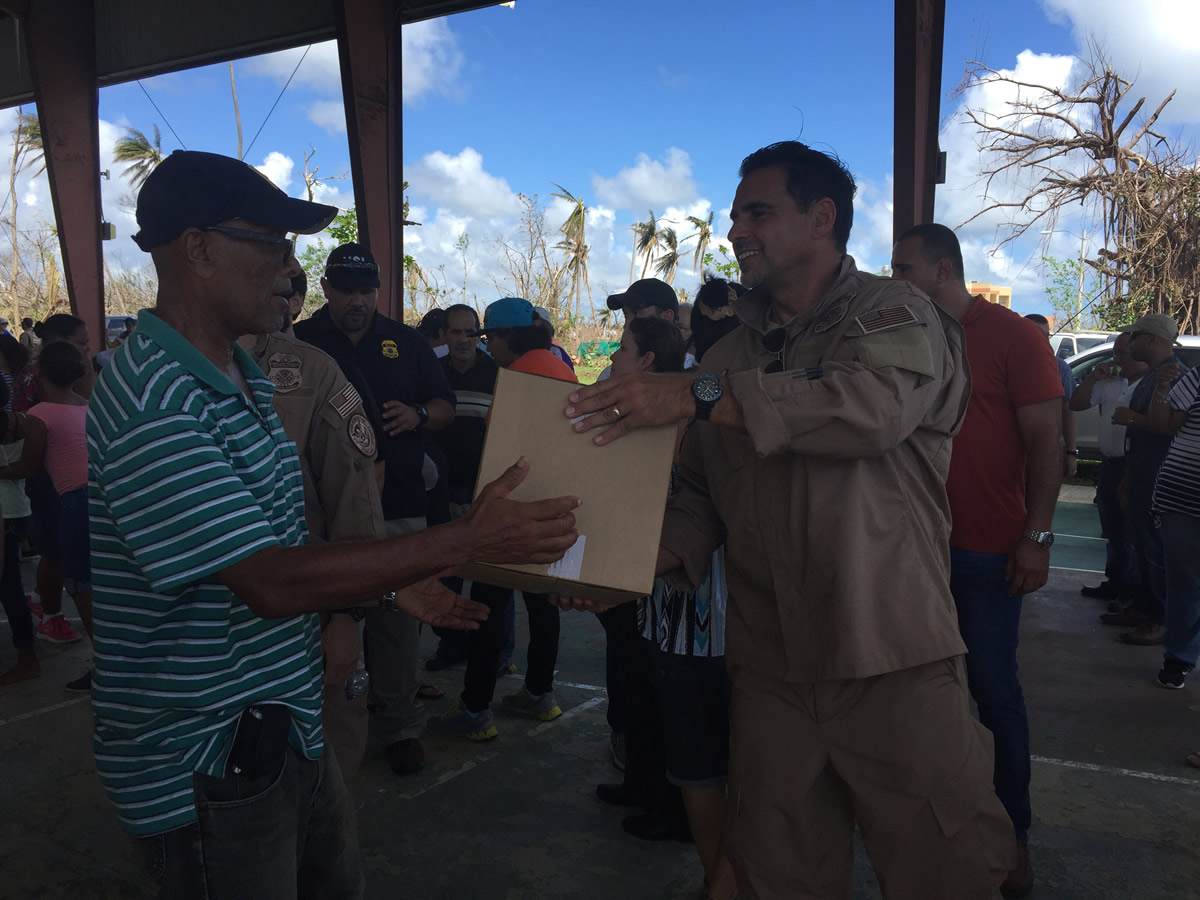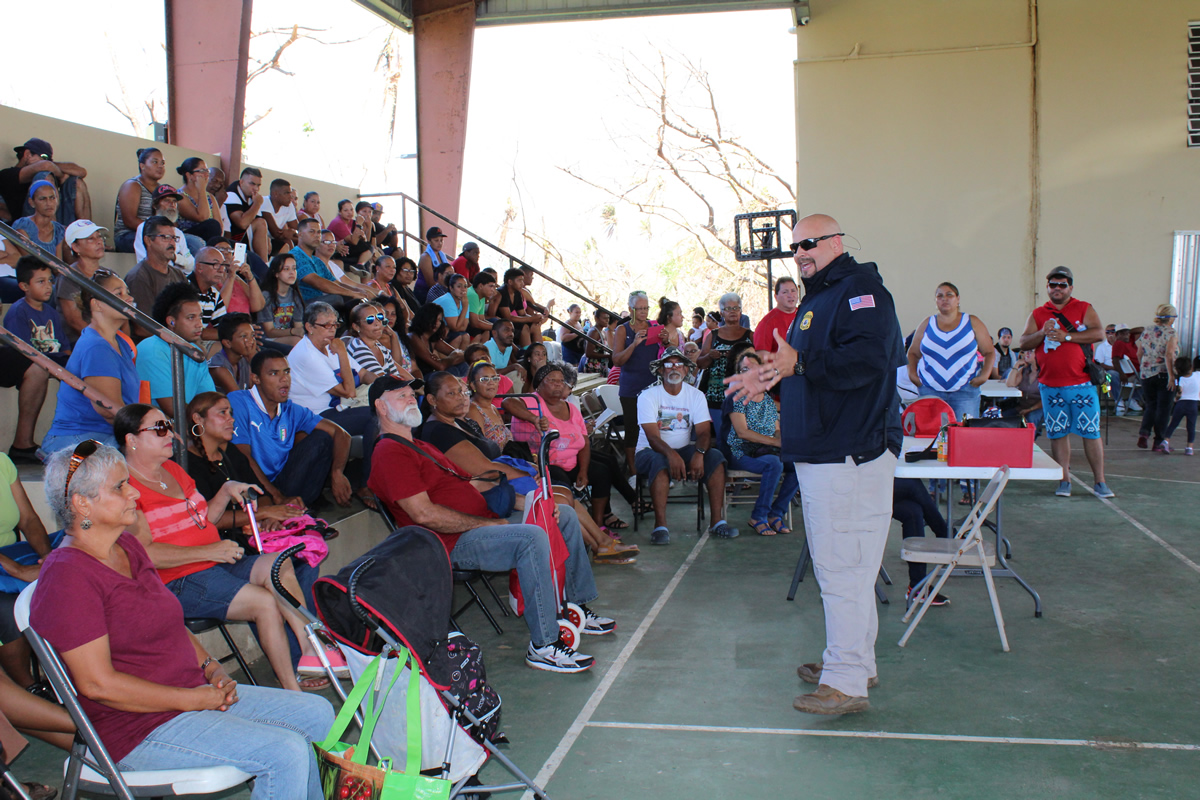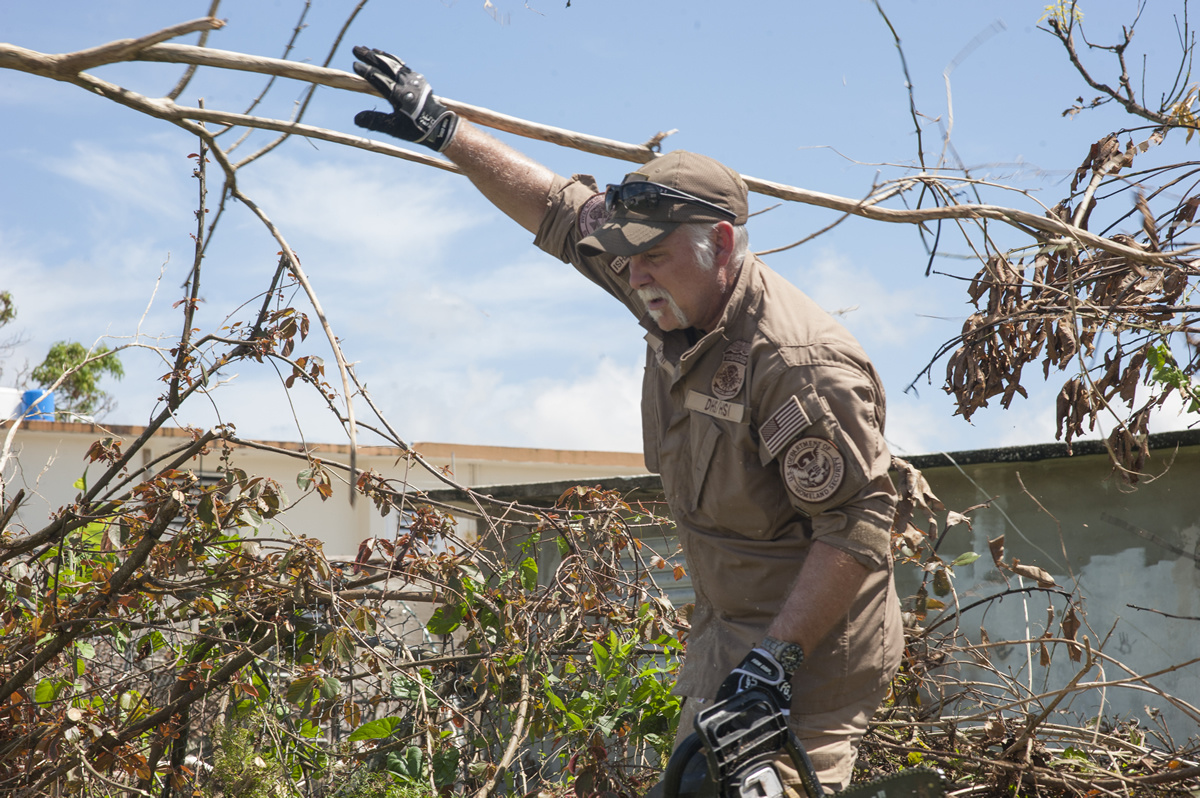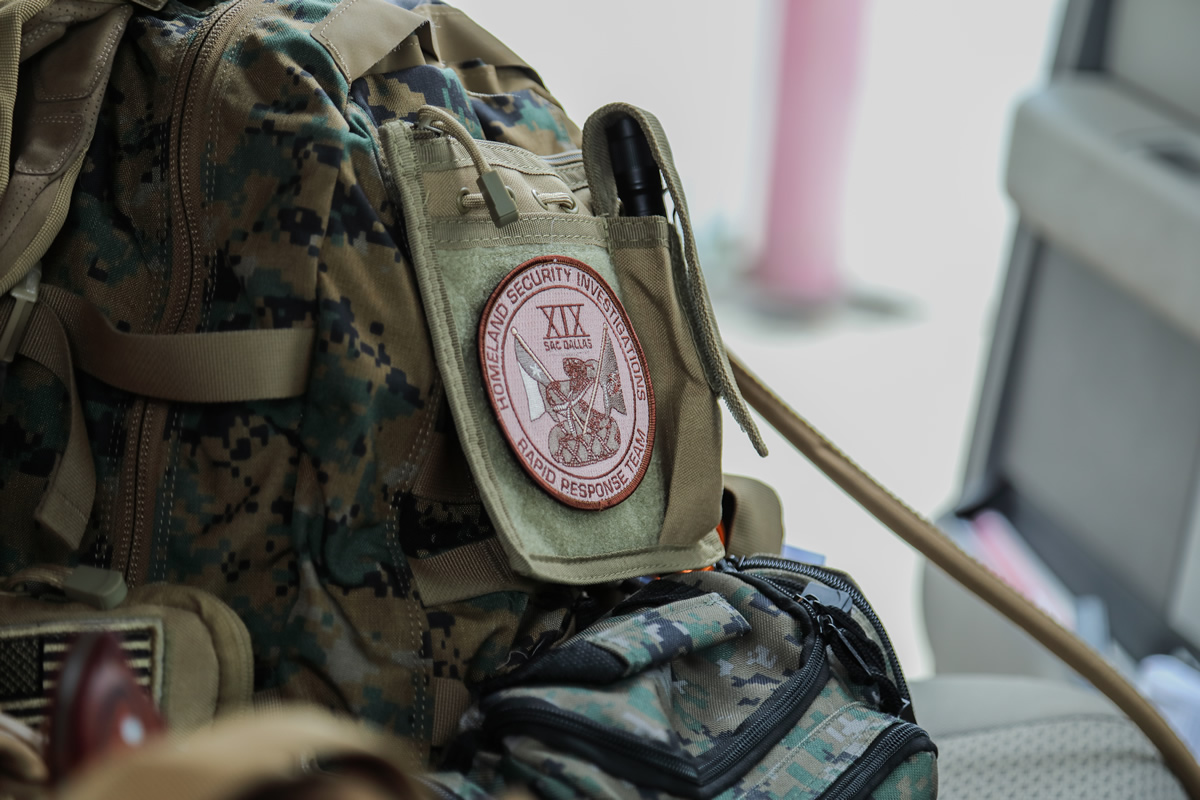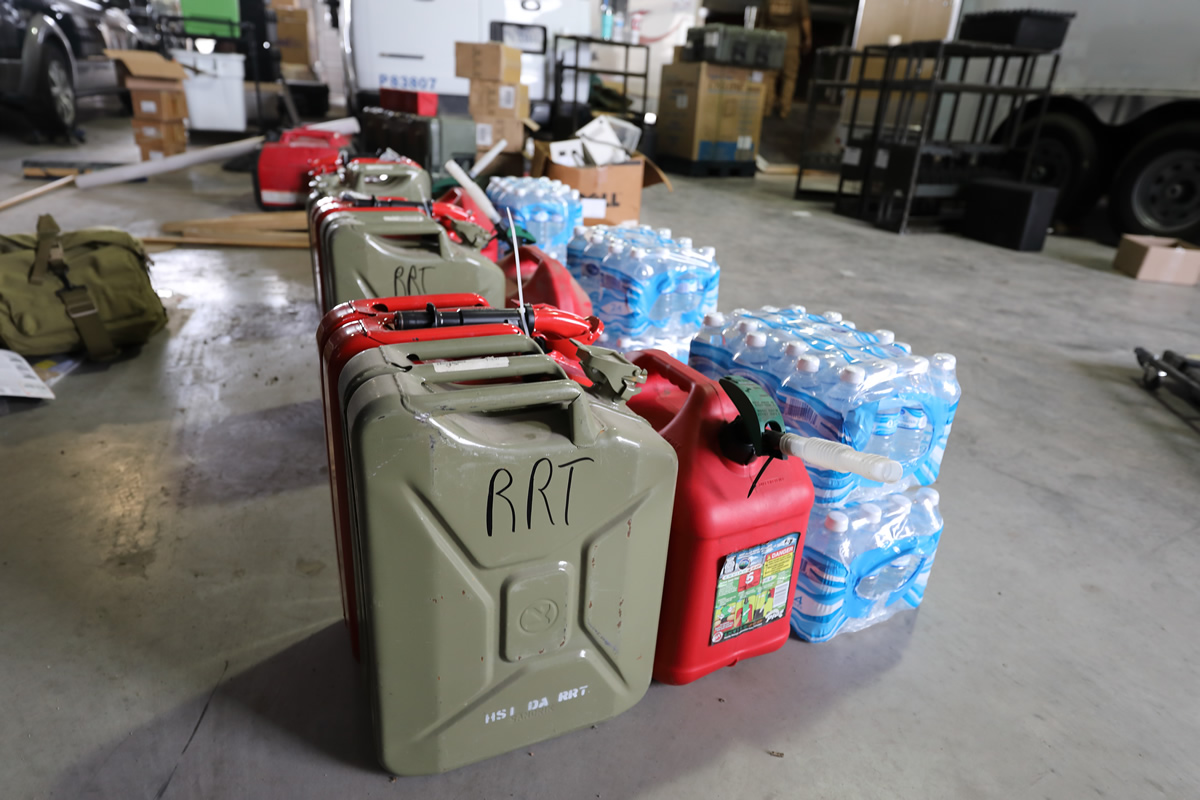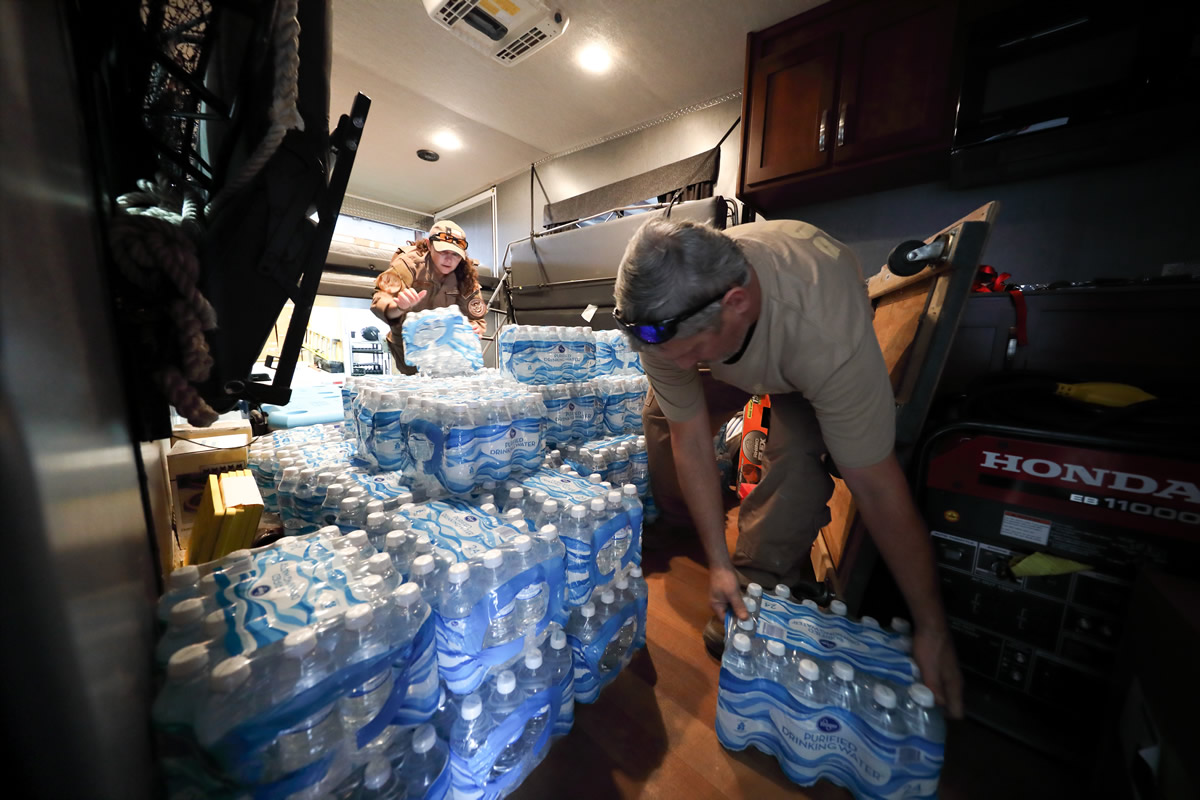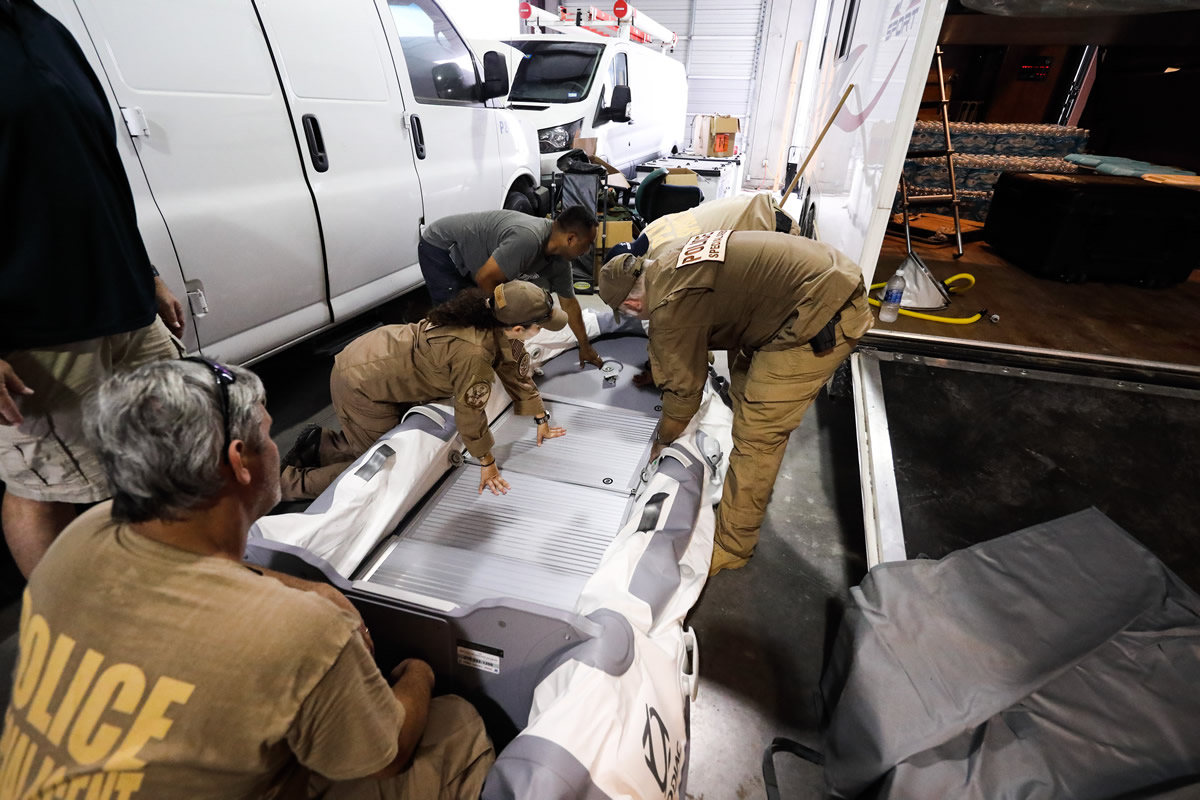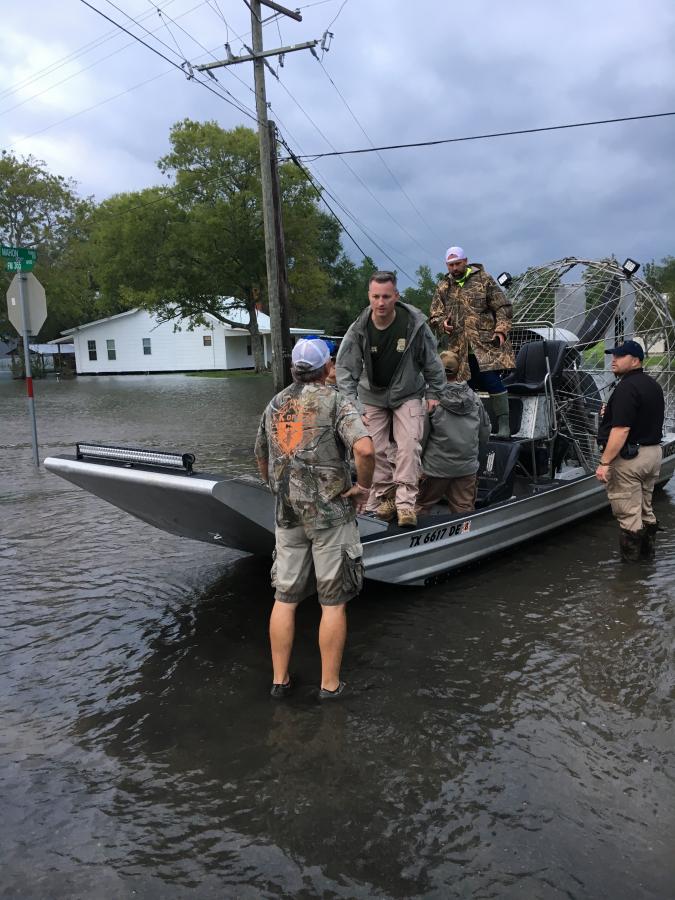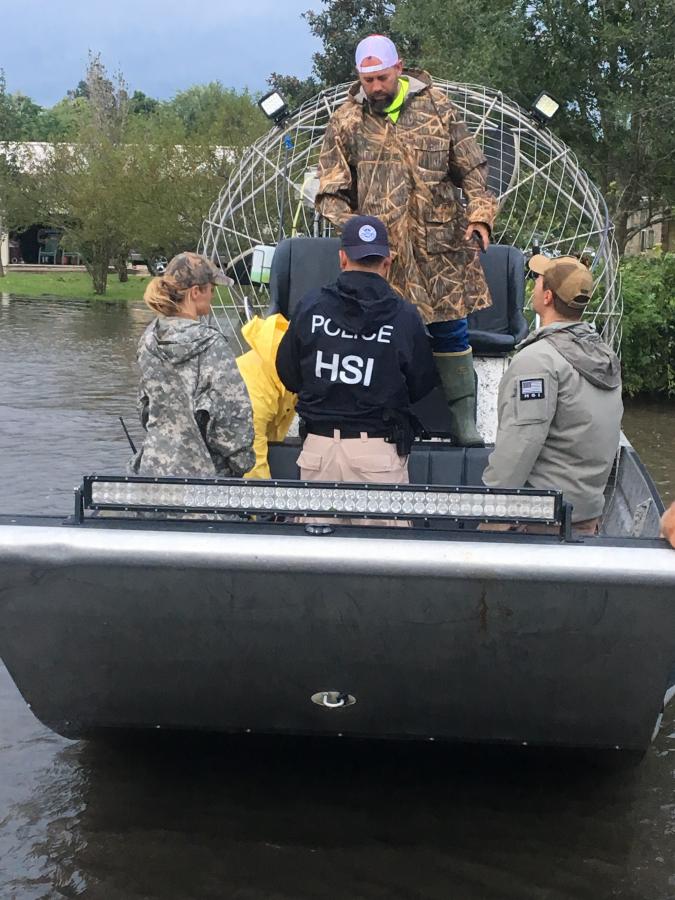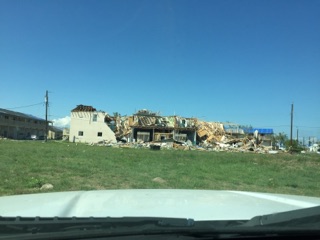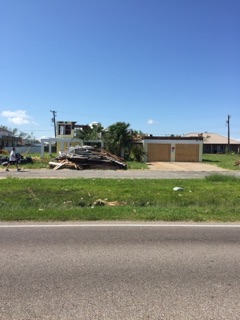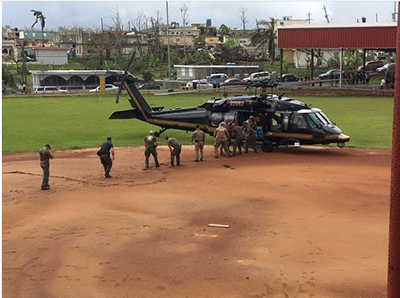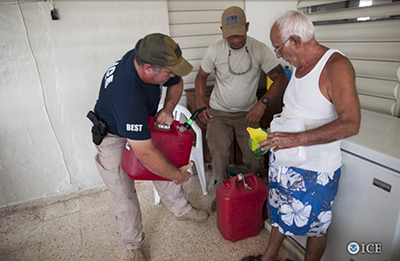
ICE HSI, CBP bring food and water to Utuado, PR
Four weeks after Hurricane Maria struck Puerto Rico, U.S. Immigration and Customs Enforcement (ICE) continues to team up with its federal partners to bring food and aid across the island, even to the most remote areas.
On Tuesday, Special Agent in Charge (SAC) Orlando Baez, ICE Homeland Security Investigations (HSI) San Juan, boarded a U.S. Customs and Border Protection (CBP) helicopter with HSI special agents from San Juan’s and New Orleans’ Special Response Teams (SRT) and CBP’s Air & Marine Operations (AMO) interdiction agents. This mission was to bring food and water to Utuado, Puerto Rico, a section of the island that has been cut off from main roads since Hurricane Maria. A member of the National Guard was there as well.
Terrain in the area is mountainous, with not many locations near the population to land with supplies. In this part of Utuado, like in many other locations, half of the bridge connecting the main road to the community was completely washed away by the surging river. The CBP helicopter landed on a riverbank close to the community so special agents could ascend up the side of the hill to a location where residents waited to greet them. It is here that SAC Baez was able to speak with members of the community and ask about their needs in this area. He asked them about their need for supplies or if anyone in the community required medical attention or wanted to leave to a shelter. Because of the difficulty to transport goods from the riverbank, the CBP helicopter circled overhead to find a better place to land in order to be able to distribute supplies. A water treatment facility was found further up the hill, and the community, gathering each neighbor in the process, drove up the muddy hillside to retrieve the supplies.
“Working together with CBP, HSI special agents are able to enter these remote areas to bring water and food into the communities. The cooperation among federal agencies during this trying time in Puerto Rico allows us to be both efficient and effective in this recovery effort,” said SAC Baez. “It is with this, and the support from the communities we serve, that we can continue to be successful in our daily missions.”
With multiple loads being dropped in Utuado, PR, “daisy chains” were formed. Community members lined up with SAC Baez and the SRT special agents, CBP AMO interdiction agents, and the National Guard, in a unified effort to unload supplies from the chopper. The goods were loaded into cars and brought to a local church that is used as a distribution center.
The supplies were provided by the Federal Emergency Management Agency (FEMA). This mission supported the distribution of more than 4000 liters of water and more than 1000 individual meals.
ICE personnel continue recovery efforts in Puerto Rico
After Puerto Rico’s biggest hurricane ravaged the island, U.S. Immigration and Customs Enforcement’s (ICE) Homeland Security Investigations (HSI) special agents and Enforcement and Removal Operations (ERO) deportation officers are more than a month into recovery efforts, which have included well-check visits, moving of debris, cutting trees, tarping roofs, work needed on homes, providing security for doctors and others who are part of the humanitarian efforts on the island, as well as bringing meals to communities and water and food to remote areas of the island.
HSI special agents from Special Response Teams (SRT) and Rapid Response Teams (RRT) who have been temporarily assigned to the recovery efforts, set off on a helicopter early Thursday to distribute food and water to those in locations too remote or inaccessible for trucks. Special agents boarded a contracted plane to first pick up supplies at Roosevelt Roads Naval Station, a former United States Navy base in the town of Ceiba, Puerto Rico. It is here that the Federal Emergency Management Agency (FEMA) organizes the distribution of food while National Guard reservists assist with the loading of the goods.
HSI special agents offer both security and distribution assistance at the drop off locations. The first drop was in the town of Guayama, a town on the south east coast of Puerto Rico. The helicopter landed in a baseball field which was surrounded by debris and downed trees that still hadn’t been removed. The roads would not give way to a delivery truck, so nearby pallets of food and water were brought to the town where lines of people waited for distribution. Special agents also ensured that those who were unable to leave their homes for supplies received them, by bringing the water and food to their door.
“The path of destruction that Hurricane Maria had left in its wake was devastating to the island. But I have witnessed the true meaning of resilience in the Puerto Rican people, and I have felt it in the tireless efforts of the men and women of ICE over the past few weeks,” said Orlando Baez, acting special agent in charge of HSI San Juan. “I also applaud the continued cooperation between federal, state and local agencies in this recovery effort, which has allowed us to help those who need it most.”
HSI special agents were also able to bring supplies to Caonillas Arriba, a mountainous community which has been very difficult to reach with anything other than a helicopter; the landing strip is a front yard and the distribution center is a home.
Tree Cutting in Casa de Todos
Rapid Response Team in Humacao
Immigration and Customs Enforcement’s (ICE) Homeland Security Investigations (HSI) special agents from San Juan and Rapid Response Team (RRT) members from Boston, Dallas and Newark, deployed to Puerto Rico, caravanned to Humacao, Puerto Rico Friday to bring hot meals, fruit and water to those in need. HSI teamed up with the Departamento de la Familia and attorneys from the Department of Justice in San Juan for this mission. They also escorted doctors from a San Juan hospital to offer well checks to the people of the town.
HSI special agents picked-up food from the Coliseo de Puerto Rico, where a group of volunteers led by Chef Jose Andres of World Central Kitchen created thousands of hot and cold meals daily. They loaded the trays of hot food and packages of fruit and water into the vehicles, all to be transported nearly two hours southeast to a Humacao community center.
On an outdoor basketball court, people lined the bleachers and children played games set up around the area. Inside, the people of Humacao welcomed the special agents and guests with warm smiles. Water and food was unloaded and tables were set up for service. HSI agents, side by side with attorneys and social workers, served each person a freshly made meal, water and fruit.
“HSI special agents have been working diligently every day since Maria hit the island. And each time they enter these towns that were ravaged by the hurricane and meet the people, it is another reminder that this recovery effort, and all the work that goes into it, is greater than us,” said Orlando Baez, acting special agent in charge of HSI San Juan.
Once all were served a meal, the Departamento de la Familia offered more food and supplies. HSI special agents managed the lines and handed out the boxes for every family present. This mission supported the distribution of hot food, boxed food, water, fruit and other household supplies to nearly 500 Humacao residents.
ICE deploys over 200 personnel to assist with Hurricane Harvey rescue efforts
Hurricane Harvey was one of the most devastating storms to hit the United States, as record-breaking rainfall tormented Southeast Texas for days, displacing thousands and causing more than 30 deaths to date.
U.S. Immigration and Customs Enforcement (ICE) has deployed approximately 200 law enforcement personnel from Rapid Response Teams (RRTs) and Special Response Teams (SRTs) around the country to provide security for search and rescue teams and to assist with search and rescue operations.
Teams from ICE offices in Atlanta, Buffalo, Chicago, Dallas, Denver, Detroit, El Paso, Houston, the National Capital Region (NCR), New York, Newark, Phoenix, San Diego, Seattle, Los Angeles and Tampa are already participating in search and rescue and security operations. Teams from San Francisco, Boston, Puerto Rico and remaining personnel of NCR are on standby.
About a dozen additional non-law enforcement ICE employees are also on their way to Texas as members of the U.S. Department of Homeland Security’s (DHS) Surge Capacity Force (SCF) to assist the Federal Emergency Management Agency (FEMA) with hurricane relief efforts. ICE anticipates that several dozen more employees will eventually be deployed.
In light of the hurricane, ICE’s highest priorities are to promote life-saving and life-sustaining activities, the safe evacuation of people who are leaving the impacted area, the maintenance of public order and the prevention of the loss of property to the extent possible, and the speedy recovery of the region.
Through text, pictures and video, OPA will provide regular updates that will highlight ICE’s efforts in ensuring the speedy recovery of the region.
Mission
- Life-saving and life-sustaining activities
- Safe evacuation of people who are leaving the impacted area
Rescues
- 100+ rescues of people in distress
Support
- 150+ ICE Rapid and Special Response Team members deployed
- 12 non law enforcement support staff with DHS Surge Capacity Force
- Teams from ICE offices in Atlanta, Buffalo, Chicago, Dallas, Denver, Detroit, El Paso, Houston, the Washington, D.C.-area, New York, Newark, Phoenix, San Diego, Seattle, Los Angeles and Tampa
Equipment
- Generators, fuel trucks, food, water, and mobile communication units in strategic locations to assist with response efforts
HSI Tampa team rescues family and neighbors from flooding
As a result of a call for help from a fellow HSI employee, the HSI Tampa Rapid Response Team (RRT) rescued several people trapped by rising waters outside of Beaumont, Texas, on Wednesday.
Jason Pitts, a HSI San Antonio technical enforcement officer, reached out to several people to find help for his parents, who live outside of Beaumont. His call reached HSI Tampa Group Supervisor Ritchie Flores, who is currently deployed as part of a 13-member RRT out of central and northern Florida.
As Pitts found out a local levee had failed and water was rising, the Tampa RRT team moved quickly to the area by boat and rescued Pitt’s parents and their neighbors, including small children.
“I won’t ever be able to thank them enough for their selfless actions, which resulted in saving numerous families,” said Pitts in an email to SAC Spero. “Without them, my parents would not have been able to get out. They deserve every ounce of praise that can be bestowed upon them.
Also during the course of the rescue operations, the Tampa RRT helped evacuate the U.S. Customs and Border Protection port director to safety after the Fannett Fire Department rescued him from his flooded home.
The team is comprised of HSI special agents and HSI support personnel and is designed to quickly deploy during natural and manmade disasters, as well as emergency situations, when other federal, local or state agencies request ICE law enforcement assistance.
This rapid response of 13 personnel, from across central and northern Florida, reflects their mission in that they are operational 24 hours a day, seven days a week, and are always prepared to deploy to an affected area within 12 to 24 hours.
HSI Rapid Response Team members are trained to deploy nationwide to support recovery from natural and manmade disasters or other similar events in which law enforcement and humanitarian support may be requested or required. The training includes instruction in first aid, land navigation, field patrol, rescue ropes, defensive tactics and disaster response training. The training culminates in multiple practical exercises simulating a broad range of disaster response-related scenarios.
Total ICE team effort
ICE support personnel provide Harvey and Maria relief
Mobilization of U.S. Immigration and Customs Enforcement (ICE) Rapid Response Teams started in tandem with recent hurricanes Harvey and Maria. Almost immediately as Hurricane Harvey struck in August, meticulously trained law and non-law enforcement ICE employees prepared to do battle with the first major hurricane to strike south Texas since 1970.
Employees earned the praise of ICE Acting Director Thomas D. Homan, “I’m extremely proud of the men and women of ICE who have stepped up to provide life-saving assistance to those in need.”
John Stack, mission support specialist with Homeland Security Investigations, Tampa, Florida, joined his local Rapid Response Team as a way to help others while realizing the team’s motto of “anytime, anywhere.”
He described the harsh conditions on the ground. “The streets were flooded with rising floodwaters, there was no power or running water and the constant danger that a chemical plant could explode.”
One of the team’s biggest challenges proved to be the standing water. “Just navigating our vehicles through the streets became a major challenge. We worked with Harris and Jefferson County Emergency Management Operation Centers to map our way into Texas as well as scouting roads to determine the best routes to travel,” Stack said. “Yet, at times, we still drove through some deep waters.”
Stack’s team assisted with rescues and welfare checks and helped organize the 24-hour evacuation at Jack Brook’s Regional Airport.
Lauren DeAngelis, mission support specialist, Homeland Security Investigations, Tampa, Florida, supported Hurricane Harvey from the Travel Service Center in Winchester, Virginia. She continues to make it possible for ICE and Federal Emergency Management Agency (FEMA) employees to travel to the disaster site in Texas by creating travel authorizations and vouchers.
Her motivation for joining the Rapid Response Team comes from personal experience. “I have friends and family that were affected by Hurricane Sandy,” said DeAngelis, “I saw the terrible devastation in New Jersey and how FEMA assisted them in recovering. I wanted to help others recover during this horrible disaster.”
Michael Clay, auditor, Homeland Security Investigations, Jacksonville, Florida, deployed to Carson City, Nevada. He works at a FEMA call center, talking to survivors on the phone and locating resources for assistance. “We focus on tasks which are re-prioritized hour to hour,” he said. “Sometimes the best we can do, for the victims, is to extend understanding hearts in hearing their stories.”
Some ICE volunteers are not at disaster sites, but in transit. Amy Fletcher, mission support specialist, Homeland Security Investigations, Tallahassee, Florida, and Joseph E. Wilkicki, Enforcement and Removal Operations, Charlotte, North Carolina, work in the logistics department at the FEMA Joint Field Office. They share driving responsibilities as they traverse more than 450 miles per day delivering critical communication supplies like printers, iPhones and transponders.
They observe much from the road; “Texas is a flat state along the coast and the reality is that not much land escaped damage,” said Fletcher. “There are still towns with no electricity and power lines lying on the ground.”
Their challenges prove both personal and practical. “My biggest challenge, other than missing my 3-year old daughter, is trying not to spend too much time talking with the survivors,” said Fletcher. “Since we have so many stops a day, I have to be mindful about the time and how long it takes to get my work done.”
Stack does not doubt the resiliency of the Texas people; “The Texans are strong people. I spoke with many who had lost everything yet their spirits were good; they are very determined to get back to their homes and rebuild. I can’t say enough good things about the many local community volunteers that worked tirelessly throughout the storm to assist victims and first responders.”
Fletcher agrees the folks of Texas are not victims, but survivors. “Texans are a resilient breed; they've lost their homes, prized possessions and despite the humidity, heat and pterodactyl-sized mosquitoes, they've pulled their boots on and are hard at work cleaning. They stand proud as they encourage one another every day.”
Hurricane Maria, the worst storm to hit Puerto Rico in a century, paid a visit to the island in September with winds reaching speeds of 155 miles per hour. ICE mobilized Rapid Response Teams from Tampa, El Paso, Atlanta, Arizona and New York to assist those facing dangerous conditions in the aftermath of the storm.
The ICE Homeland Security Investigations Human Exploitation Rescue Operative (HERO) Child Rescue Corps program employs highly-skilled veterans who fight online child exploitation using their law enforcement and computer forensic skills. Two of these veterans, Nathan Cruz and Nicholas G. Volpicella, deployed for a 21-day rotation from Tampa and Orlando, Florida, to San Juan, Puerto Rico, as part of the Team.
The ICE Rapid Response Team’s mission, in coordination with FEMA, was to ensure the safety of all residents of Puerto Rico. They also sought out ICE employees, and their families who reside in Puerto Rico, to ensure life-essential needs were provided.
For Cruz, computer forensic analyst and Army veteran, the mission meant much more. “My entire family is in Puerto Rico. I am from Puerto Rico.”
After confirming his parents were unharmed, and helping them get safely to temporary housing, Cruz and the rest of the Team began delivering food and water, installing tarps as temporary shelter, providing power tools and clearing debris from living areas. The Team worked to find much needed medicine and the refrigeration to store it, and provided temporary access to satellite phones to residents so they could contact family members.
Department of Homeland Security components worked seamlessly together for the good of the territory. ICE and FEMA partnered with a local chef to deliver hot food to elderly homes, hospitals and orphanages on the island. ICE and U.S. Customs and Border Patrol evacuated stranded Puerto Rico residents by air and reunited them with family members on the U.S. mainland.
“The Island was devastated by this hurricane,” said Cruz. “It did not discriminate. If you had a concrete house; it flooded, if you had a wooden house with a tin roof; the roof is gone. The flooding ranged from less than an inch to up to eight feet.”
Volpicella, computer forensic analyst and Marine Corps veteran, treated the mission like any other military deployment in the past. “The reality of the situation on the ground didn’t have the shock appeal to me that it did to some people,” he said. “I’ve been on combat and humanitarian missions in the past; I was familiar with the chaos of the situation.”
The Team provided help to people as needed. “We made sure our presence was impactful in a positive way,” said Volpicella, “Whether that meant we provided a bottle of water as a thank you to a police officer directing traffic or by cutting down a tree for a family so they could have a clear path.
“It blew me away that every person we stopped to ask for directions was willing to help us. It didn’t matter who we stopped to ask, everyone was willing to help us get to where we needed to go.
“Every single person we encountered helped us.”
